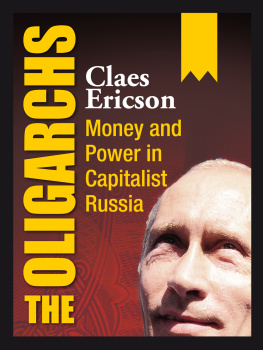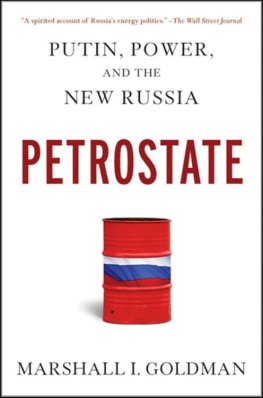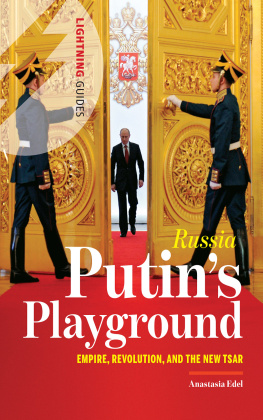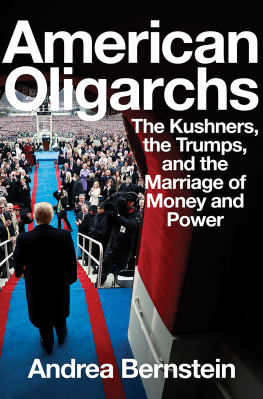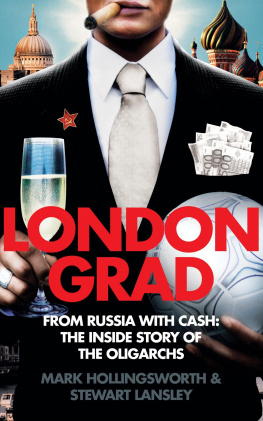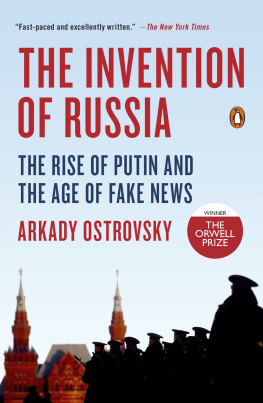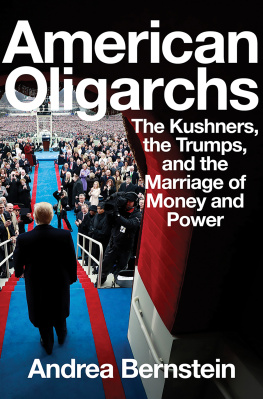Claes Ericson - The Oligarchs: Money and Power in Capitalist Russia
Here you can read online Claes Ericson - The Oligarchs: Money and Power in Capitalist Russia full text of the book (entire story) in english for free. Download pdf and epub, get meaning, cover and reviews about this ebook. year: 2012, publisher: Stockholm Text, genre: Politics. Description of the work, (preface) as well as reviews are available. Best literature library LitArk.com created for fans of good reading and offers a wide selection of genres:
Romance novel
Science fiction
Adventure
Detective
Science
History
Home and family
Prose
Art
Politics
Computer
Non-fiction
Religion
Business
Children
Humor
Choose a favorite category and find really read worthwhile books. Enjoy immersion in the world of imagination, feel the emotions of the characters or learn something new for yourself, make an fascinating discovery.
- Book:The Oligarchs: Money and Power in Capitalist Russia
- Author:
- Publisher:Stockholm Text
- Genre:
- Year:2012
- Rating:3 / 5
- Favourites:Add to favourites
- Your mark:
- 60
- 1
- 2
- 3
- 4
- 5
The Oligarchs: Money and Power in Capitalist Russia: summary, description and annotation
We offer to read an annotation, description, summary or preface (depends on what the author of the book "The Oligarchs: Money and Power in Capitalist Russia" wrote himself). If you haven't found the necessary information about the book — write in the comments, we will try to find it.
The Oligarchs: Money and Power in Capitalist Russia — read online for free the complete book (whole text) full work
Below is the text of the book, divided by pages. System saving the place of the last page read, allows you to conveniently read the book "The Oligarchs: Money and Power in Capitalist Russia" online for free, without having to search again every time where you left off. Put a bookmark, and you can go to the page where you finished reading at any time.
Font size:
Interval:
Bookmark:
Claes Ericson
The Oligarchs
Money and Power
in Capitalist Russia
Stockholm Text
Previous books by Claes Ericson:
Russia Now: Trends in the Shadow of the Kremlin
The Humorous History of the Soviet Union: Power, People & Poking Fun
(with David Cesarini)
Stockholm Text
www.stockholmtext.com
2012 Claes Ericson and Stockholm Text Publishing AB, Stockholm
Fact checking: Kalle Kniivil
Translation: Hugh Rodwell
Cover: Dorian Mabb
All photographs TASS except:
pg. 254 and 360 Wikipedia Commons
pg. 279 and 313 East Capital
pg. 340 Nobelstiftelsen
Photo of the author: Helen Vallhov
ISBN e-book 978-91-87173-08-0
What do the following four people have in common: an orphan in northern Siberia, an unemployed stage producer driving a black taxi, a young Communist in aviator glasses running a caf, and an award-winning mathematician at the Academy of Sciences? The answer is that each of them has at one time been Russia's richest man. The Oligarchs describes their paths to wealth and the reasons why none of them are the richest man any longer.
The story covers two decades full of bold privatization projects, fateful power struggles, and scarcely credible life stories. The tale of how it was possible for private individuals to amass unprecedented fortunes immediately following the fall of the Soviet Union in 1991 illustrates Russia's transition from a planned economy to a market economy. With Vladimir Putin back as the countrys President in 2012, stability seems to prevail. But it has been a bumpy ride.
It is impossible for an observer to remain completely neutral in relation to these developments. Capitalism killed Soviet communism and created the preconditions for building a completely new society. But for the great majority, the transformation initially entailed far greater hardship than under the Soviet system, while a few people used influential contacts, sharp elbows, and an indomitable entrepreneurial spirit to make themselves very rich. This is the history of the Russian oligarchs.
In his original form, a Russian oligarch is a man with both financial and political clout. For some, political clout has generated financial influence, for others, the equation is reversed. The first generation of oligarchs, which I call the nomenklatura oligarchs, had a political platform thanks to a career within the Communist Party that made it possible for them to make a fortune. These nomenklatura oligarchs controlled the infant market economy following the fall of the Soviet Union.
But some years into the 1990s, a connection with the state was no longer needed. Suddenly a completely different group, which I call the entrepreneurial oligarchs, became predominant audacious young capitalists who had previously been near the bottom of the social hierarchy. All at once they possessed political power far exceeding their newly acquired riches.
In the 21st century, the pendulum has swung back to a remarkable degree, and civil servants once again control large parts of the Russian economy due to their political positions. The strengthening of the state has deprived the entrepreneurial oligarchs of a great deal of the power their personal wealth brought them in the 1990s. At the same time the term "oligarch" has lost much of its original meaning. The billionaires, although admittedly richer than ever, have become more and more subservient vis--vis the state, while members of the government and Kremlin bureaucrats take decisions more on the basis of their offices than their fortunes. Despite its dilution, the term oligarch is used throughout the book for the country's super-rich, as their status is the same.
Much of the factual material in the following chapters consists of second-hand sources including newspaper articles and books. Russian statistics and Russian data are not always reliable and may have a degree of uncertainty. In his book, Godfather of the Kremlin, the Russian-American journalist Paul Klebnikov observes that "agreements in Russian business deals and Russian politics are sealed with a handshake. Rarely is anything written down. Frequently this kind of contract is more reliable than a written one, so a careful observer of Russia today should not be dismayed by the lack of Western-style documentation."
Klebnikov is relatively nuanced in his comments regarding Russia's development, but other books contain descriptions of events contrasting strongly with his presentation, particularly in relation to the godfather, Boris Berezovsky. It is not always easy to pinpoint the dividing-line between objective facts and subjective interpretations. As it happens, Klebnikov was murdered in July 2004 an assassination which many attribute to his work as a journalist.
I have checked my sources as thoroughly as possible, but in spite of this, there are occasional elements of conjecture. Where this is the case, I have tried to indicate as clearly as possible that the information is not verified. It is very likely that these parts of history will never come to light.
Claes Ericson
Stockholm, March 2012
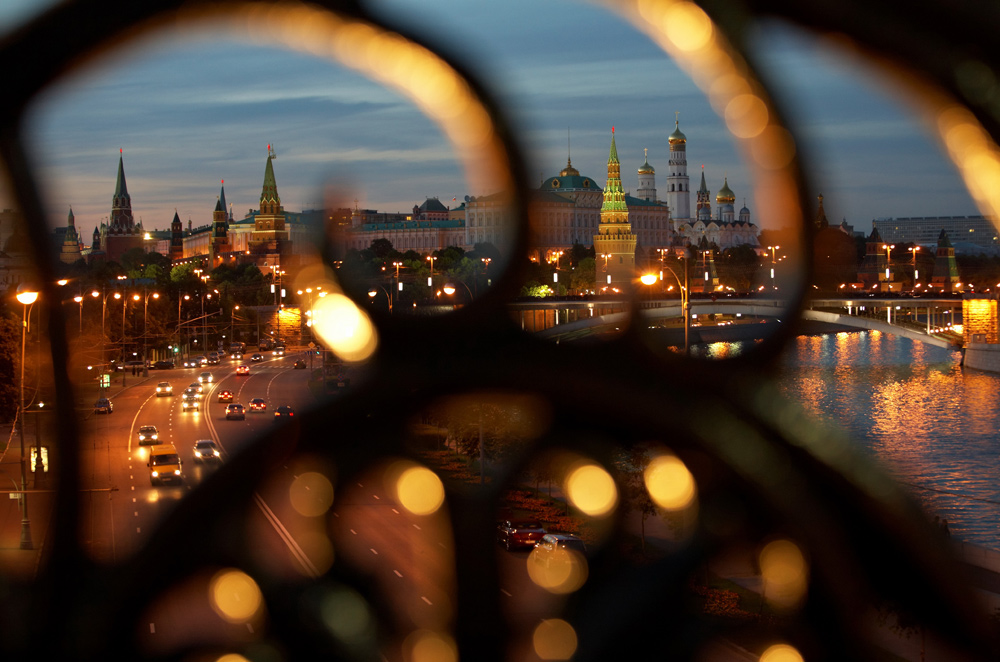
NOTE:
Parts I and II describe economic developments in Russia from perestroika to date. Part III deals with some particularly striking market economy phenomena. Key individuals and incidents are presented in greater detail in special sections. These sections overlap the main text to some extent and may be read independently or skipped. At the end, there are summaries of the most important events and people discussed herein.
To understand Russias situation in the late 1980s, it is necessary to know the countrys historical background. For this reason, there are introductions to tsarist Russia and the Soviet Union from an economic perspective in separate appendices. Readers who are acquainted with events preceding the fall of the Soviet Union may dive straight into Part I.
"I knew they were going to arrest me."
Mikhail Khodorkovsky at Tolmachevo airport in Novosibirsk, Saturday, October 25, 2003
At a quarter past five in the morning, the refueling of the Tupolev 134 that was parked on the deserted runway was suddenly interrupted. The privately chartered plane was to have continued to Irkutsk as soon as it was refueled, but now it was moved by a truck to a distant part of the airport.
The cockpit door was thrown open and the crew quickly scuttled down to the tarmac. Their breath formed big clouds in the chilly morning air. Visibly shaken, they hurried across to the terminal building, the snow creaking under their thin loafers. And then it went silent.
The silence was broken by the roaring of V8 engines. Two black buses with darkened windows drove rapidly up to the aircraft. They stopped abruptly by its tail with their headlights on the wing, and about ten uniformed men ran the few yards to the steps, slightly crouching as they ran.
The markings on their dark camouflage jackets were those of the Alpha Group, the special operations unit of the Federal Security Service (FSB). In helmets and bulletproof vests, armed with submachine guns, they were ready to resort to violence if necessary. Their task was to arrest a man suspected of the biggest tax felony in Russian history.
At the same time, dark shadows moved behind the walls of snow thrown up by the snow plows, and police cars with flashing blue lights drove up. The plane was surrounded by dozens of armed guards, including the troops of the Federal Security Service. It would have taken a small army to break through the cordon.
Next pageFont size:
Interval:
Bookmark:
Similar books «The Oligarchs: Money and Power in Capitalist Russia»
Look at similar books to The Oligarchs: Money and Power in Capitalist Russia. We have selected literature similar in name and meaning in the hope of providing readers with more options to find new, interesting, not yet read works.
Discussion, reviews of the book The Oligarchs: Money and Power in Capitalist Russia and just readers' own opinions. Leave your comments, write what you think about the work, its meaning or the main characters. Specify what exactly you liked and what you didn't like, and why you think so.

